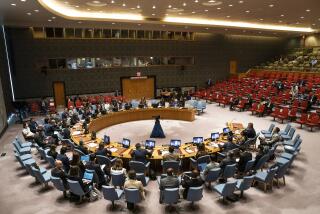White House Says Shultz Spoke for Self in Opposing Grain Deal
- Share via
WASHINGTON — The White House, faced with a deteriorating farm economy and its effect on the fall Senate races, said Monday that Secretary of State George P. Shultz was speaking for himself when he voiced opposition to a Senate proposal to sell U.S. subsidized grain to the Soviet Union and China.
“Secretary of State Shultz has expressed a view,” said White House spokesman Larry Speakes, “but the President has not made a decision.”
Shultz told reporters Friday that it is “ridiculous” to talk about subsidizing grain sales to the Soviet Union. He pointed out that the measure, hastily passed by the Senate last week, could create an international incident with Australia, a major supplier of wheat to the Soviet Union and China.
Pending Before Committee
Top Administration officials involved with trade, agriculture and national security issues met at the White House to discuss the domestic and international ramifications of the legislation, which is pending before a joint House-Senate conference committee.
The officials, including Shultz and Agriculture Secretary Richard E. Lyng, presented President Reagan with such conflicting recommendations that Speakes said: “I don’t think there’s anybody in the room willing to predict what the President’s decision will be on it.”
The measure, introduced by Senate Majority Leader Bob Dole (R-Kan.), directly pits the interests of Midwestern farmers against established trade policies with regard to the Soviet Union. If Reagan sides with one or the other side, he will have to pay a price either in terms of disgruntled farmers at home or irate allies abroad.
‘Philosophical Questions’
“The President is very much aware of the difficulties American farmers are experiencing, and he’s concerned about it,” a White House spokesman said. “At the same time, the question of subsidizing exports to the Soviet Union raises serious philosophical questions.”
With such touchy issues at play, the White House did not look with favor upon Shultz’s instant rejection of the Senate provision, especially because several key Senate races could turn on how Reagan deals with farm problems. While Shultz approached the issue from a foreign-policy perspective, White House officials think he did not take into account the domestic side of the equation.
By distancing Reagan from Shultz, these officials hope to buy Reagan some time to work out a possible compromise with Dole. At Dole’s urging, the measure was attached as a rider on a routine House-passed bill relating to the Export-Import Bank. It sailed through the Senate last week, apparently taking the Administration by surprise.
More to Read
Sign up for Essential California
The most important California stories and recommendations in your inbox every morning.
You may occasionally receive promotional content from the Los Angeles Times.













